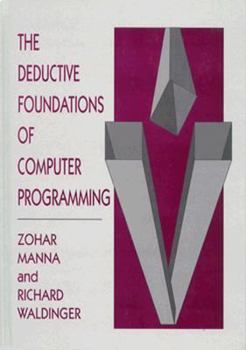The Deductive Foundations of Computer Programming
This work provides a most readable introduction to the logical concepts and techniques underlying computer programming. This description may be from another edition of this product.
Format:Paperback
Language:English
ISBN:0201548860
ISBN13:9780201548860
Release Date:January 1993
Publisher:Addison-Wesley Professional
Length:736 Pages
Weight:2.45 lbs.
Dimensions:1.3" x 6.7" x 9.5"
Customer Reviews
2 ratings
A Good Start Toward Automated Reasoning
Published by Thriftbooks.com User , 24 years ago
This book is a good introductory catalog of automated reasoning concepts and methods. But I believe that programmers who are going to write automated reasoning systems should augment their computer knowledge (of logic) by learning a full- blown (serial, not tree) logical notation for both 1st and 2nd order predicate calculus.Solving the inference problem is NP-Complete, and computational cycles explode as the number of premisses increase. Automated methods of solving the inference problem are often O(n^2) and often infeasible, for "real-world" problems. Most programmers don't have a broad enough horizon in formal logic to quickly recognize WHEN a certain automated technique will be useful.I suggest a symbolic logic text such as Copi's Symbolic Logic, 5th ed., and then aggressively read about optimizing methods which are currently being developed (ex. Optimization Methods for Logical Inference, Chandru et alia).However, as an introduction, the reviewed book is excellent.
Excellent Textbook for a First Logic Course in CS
Published by Thriftbooks.com User , 24 years ago
I really liked this book. It is full of examples, and the explanations are clear and concise. The book guides you through predicate logic and first order logic and procedures for automated deductive systems for them. No previous knowledge is assumed. The book is also full of exercises and problems.I do recommend this book for students of Computer Science and Mathematics who want to start learning about automated deductive systems and axiomatic theories.





